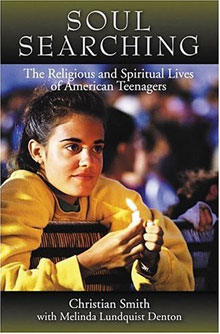 Last Sunday I mentioned a book titled Soul Searching: The Religious and Spiritual Lives of American Teenagers, by Christian Smith. This book was critical to me during my doctoral dissertation a few years back. Smith and his research team spent years interviewing thousands of teens to find out what American teenagers believed about God. His results were impeccably researched and met the highest academic standards.
Last Sunday I mentioned a book titled Soul Searching: The Religious and Spiritual Lives of American Teenagers, by Christian Smith. This book was critical to me during my doctoral dissertation a few years back. Smith and his research team spent years interviewing thousands of teens to find out what American teenagers believed about God. His results were impeccably researched and met the highest academic standards.
Here is his conclusion: “we suggest that the de facto dominant religion among contemporary U.S. teenagers is what we might well call ‘Moralistic Therapeutic Deism.’ The creed of this religion, as codified from what emerged from our interviews, sounds something like this:
- A God exists who created and orders the world and watches over human life on earth.
- God wants people to be good, nice, and fair to each other, as taught in the Bible and by most world religions.
- The central goal of life is to be happy and to feel good about oneself.
- God does not need to be particularly involved in one’s life except when God is needed to resolve a problem.
- Good people go to heaven when they die” (162-163).
This belief system is a mix of world religions, modern media influences, and personal narcissistic tendencies. The result is a deeply flawed set of beliefs that does not line up with Scripture in the slightest.
As believers, our job is to separate fact from fiction and dispel the myths with the truth of God. As Paul states it, “We demolish arguments and every pretension that sets itself up against the knowledge of God, and we take captive every thought to make it obedient to Christ.” 2 Corinthians 10:5
As a youth pastor, I saw this set of beliefs lived out in the lives of many of my students. If this truly is the prevailing religion of the next generation, then we have a lot of work to do.
QUESTION: Have you seen any of these beliefs played out in the lives of today’s young people?















